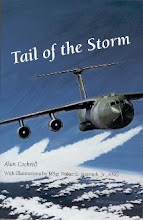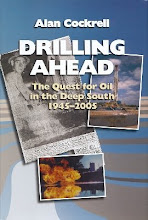Continued from the previous post:
I went back to Denver and checked-in for the second round of gauntlets and waterboarding. Without ado they ushered me into the office of a shrink—a real one, with several impressive diplomas on his wall. He asked me more of the same kind of questions on the big psychological written test I had taken on the previous visit. I knew to be careful not to contradict myself in questions that were disguised as being different but in reality the same.
The session wasn’t too stressful until the doc became obsessed with the sole of my shoe. While I proffered a profound answer to one of his more probing questions he leaned over and looked at my shoe, eyes bulging, as if he had found a newly discovered species of insect on it. I immediately recognized this was a diversionary tactic. I wondered how to react as I delivered my discourse on whatever silly question he had posed upon me.
He might have been testing me to see if I noticed what he was doing. Not to notice would have been an indication of a lack of situational awareness—bad trait for the gig I was applying for. But an over-reaction would surely have been interpreted as belligerence or self-consciousness, both equally bad. I took a chance and turned the table on him. In the middle of whatever I was saying I paused and asked him, “Are you okay, doc?” He looked up at me and nodded.
Other airlines also used psychiatrists to screen candidates. It seemed to stop when the rumor circulated that the shrink Delta used to interview their candidates committed suicide. Apparently, asking pilots sensitive personal questions was more than the poor soul could live with. But then, if I had to make a living probing Delta pilots’ innermost thoughts, I too would take to the noose.
Other airlines also used psychiatrists to screen candidates. It seemed to stop when the rumor circulated that the shrink Delta used to interview their candidates committed suicide. Apparently, asking pilots sensitive personal questions was more than the poor soul could live with. But then, if I had to make a living probing Delta pilots’ innermost thoughts, I too would take to the noose.
After the session with the shrink it was off to the simulator building for the part of the process that I dreaded the least—the sim check. I made damned sure I knew where to go this time.
An instructor pilot who was retired from line flying briefed me on the Boeing 727, an aircraft I had never before flown. He was a nice fellow and made me feel totally at ease. Now, for the first time since I had started this whole ridiculous process I had met one of my own kind. I was at home with the man and finally felt I could just be myself.
An instructor pilot who was retired from line flying briefed me on the Boeing 727, an aircraft I had never before flown. He was a nice fellow and made me feel totally at ease. Now, for the first time since I had started this whole ridiculous process I had met one of my own kind. I was at home with the man and finally felt I could just be myself.
He put me in the left seat of the 727 simulator and set it up for a takeoff. The sim handled very well and I had no trouble flying it. He tried to distract me during an ILS approach by letting the engine fire alarm scream in my ears. I landed the sim and he said I did great. This was the first affirmation I had received from anyone while running through the gauntlet of the screening process. I felt good and went to the hotel to rest a while before the final interview—the big one.
It didn’t start off well. I checked in with the receptionist and saw her look curiously at me. I think she was aghast that I would show up for such an important interview dressed in a Navy blue sport coat and khaki pants. Then I took a quick trip to the lavatory for a nervous pee. In full view of the receptionist I went into the women’s restroom. I quickly saw my error and came out grinning sheepishly as she eyed me under a raised eyebrow. I saw her pick up her phone. I began evaluating other employment options.
It didn’t start off well. I checked in with the receptionist and saw her look curiously at me. I think she was aghast that I would show up for such an important interview dressed in a Navy blue sport coat and khaki pants. Then I took a quick trip to the lavatory for a nervous pee. In full view of the receptionist I went into the women’s restroom. I quickly saw my error and came out grinning sheepishly as she eyed me under a raised eyebrow. I saw her pick up her phone. I began evaluating other employment options.
The panel consisted of two people—the woman in charge of hiring and a captain in uniform. We exchanged pleasantries and I answered more questions about my application. Then, sure enough they asked me to give them an example of how I had had a significant disagreement with a previous supervisor/teacher/co-worker and what I had done about it. I was ready. Familiar with that kind of question, I had employed it many times while screening Air Force Academy candidates.
Then the big question came. Every candidate expected it. All the airlines were asking it. It was the question that applicants practiced the hardest for. Everyone studied up on the airline's history and tradition, and memorized a spiel. The consultant gurus that specialized in pilot placement even coached their clients on how to answer this question. Many candidates stood looking in the mirror while reciting their answer. They tested their answer on their wives and buddies. I didn’t do any of that.
“Tell us why you want to fly for United."
I didn’t have to fabricate some sort of custom variation on a canned answer. I had a response that would water their eyes. “I’ll answer that question with a true story,” I said. They perked up.
“Last year I was hired to fly a couple of journalists around in a Cessna for a story they were doing on the Gulf Coast oil industry. I was having lunch with them and one of them asked me if I wanted to fly for the airlines. I told them I was in the process of sending out applications. They wanted to know which airline I preferred. I said it didn’t much matter. Then one of them said, ‘I fly a lot. I live in Denver, which is a big United hub. And as for me personally, if it’s not a Boeing airplane with a United crew, I don’t want to fly it.’ I knew then and there that I wanted to be a part of that legacy.”
I could hardly keep from grinning when I finished the story (which was precisely true). I knew I had had hit a grand slam. I saw it on their faces. The letter came a week later. I was in.
But was I where I really wanted to be? That question kept nagging at me, and a few months later would tear me apart.
The next post: Part III, The Day I Quit the Airline. (Think I'm being facetious? I'm not. You won't want to miss it.)
Then the big question came. Every candidate expected it. All the airlines were asking it. It was the question that applicants practiced the hardest for. Everyone studied up on the airline's history and tradition, and memorized a spiel. The consultant gurus that specialized in pilot placement even coached their clients on how to answer this question. Many candidates stood looking in the mirror while reciting their answer. They tested their answer on their wives and buddies. I didn’t do any of that.
“Tell us why you want to fly for United."
I didn’t have to fabricate some sort of custom variation on a canned answer. I had a response that would water their eyes. “I’ll answer that question with a true story,” I said. They perked up.
“Last year I was hired to fly a couple of journalists around in a Cessna for a story they were doing on the Gulf Coast oil industry. I was having lunch with them and one of them asked me if I wanted to fly for the airlines. I told them I was in the process of sending out applications. They wanted to know which airline I preferred. I said it didn’t much matter. Then one of them said, ‘I fly a lot. I live in Denver, which is a big United hub. And as for me personally, if it’s not a Boeing airplane with a United crew, I don’t want to fly it.’ I knew then and there that I wanted to be a part of that legacy.”
I could hardly keep from grinning when I finished the story (which was precisely true). I knew I had had hit a grand slam. I saw it on their faces. The letter came a week later. I was in.
But was I where I really wanted to be? That question kept nagging at me, and a few months later would tear me apart.
The next post: Part III, The Day I Quit the Airline. (Think I'm being facetious? I'm not. You won't want to miss it.)
Crossing East and West Spanish Peaks, Colorado
east to west. I have climbed the west peak 5 times.
It's one of my favorite places on the planet.
Sometimes I feel a strange exhilaration up here which seems to come from something beyond the mere stimulus of flying. It is a feeling of belonging to the sky...of owning and being owned―if only for a moment―the air I breathe.
―Guy Murchie
Song of the Sky



